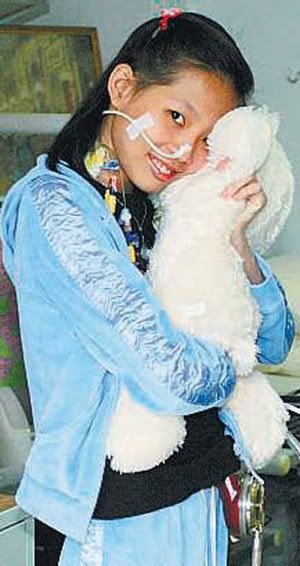I'm so glad Hui Yi just got a heart, and in the nick of time... It was really the best news to listen to this morning. God bless the soul & family of the donor, and praise the Lord for giving Hui Yi what she really needs. But the ordeal's not over, as she's still in a critical stage. And after all this, it's still a long road to discovery, but it's really really good news that she received a donor. All I hope for now is that she would get out of the critical stage and have a slow and steady recovery. Let us all pray for her recovery k~
Here's a snippet from today's news, I'd figure it'll explain better than me...
New heart, New hope for Hui Yi

KUALA LUMPUR: For one year and four days, she suffered the agony of dragging a 9kg battery pack which powered her mechanical heart.
But on Wednesday, four days after making another tearful plea for a heart, relief arrived.
Tee Hui Yi underwent a successful heart transplant at the National Heart Institute (IJN).
The donor heart was a gift from the family of a 15-year-old Malay accident victim in Ipoh. Tee, however, remains in critical condition.
They began the operation at 10.45pm on Wednesday. The donor’s heart was planted into Tee at 1.30am yesterday.
The donor had died in a road accident in Ipoh and had been pronounced brain dead. Upon receiving word, the Royal Malaysian Air Force flew 13 medical officers from IJN on a CN235 aircraft to the Ipoh Hospital to collect the victim’s organs.
Also harvested were the teenager’s lungs, liver and kidneys.
The teen’s lungs benefited a 39-year-old Sabah man with idiopathic pulmonary fibrosis.
The transplant team, headed by chief cardiothoracic surgeon Datuk Dr Mohd Azhari Yakub and heart and lung transplant clinical director Dr Mohamed Ezani Md Taib, performed the surgeries simultaneously.
The man’s surgery was also a success but, like Tee, he remains in critical condition.
Both were wheeled out of the operating theaters at 9.05am yesterday.
“It was a risky operation and I will not go into details, but Tee has waited for a year and now we’ll have to wait and see,” said Health Minister Datuk Seri Dr Chua Soi Lek, who was at IJN yesterday morning.
The simultaneous operations involved six cardiothoracic surgeons, six anesthetists, one physician from the Respiratory Research Institute and 30 paramedics.
“We are very glad that Tee has finally gotten her heart. We extend our gratitude to the victim and the family,” Dr Chua said.
When she was just 2 years old, Tee was diagnosed with end-stage heart failure after suffering a viral infection.
Last year on Sept 29, she was fitted with a mechanical heart, or a Thoratec Paracorporeal Ventricular Assist Device.
The 9kg device was implanted outside the abdomen and connected to the left side of the heart and was supposed to last two years.
Tee’s parents — Tee Ah Soon and Dina Bato Sambua — were at the hospital when the surgery was done. They, however, did not meet the press.
---
How the procedure is performed
EVEN though the donor is brain dead, the procedure is done in a sterile operating room just like any other surgery. The organs are removed, preserved, and packed for transport.
The heart must be transplanted into the recipient within four to five hours. The recipient is given general anesthesia and placed on the cardiopulmonary bypass machine. This machine oxygenates the blood while the transplant is being performed.
Once the transplant is done, the donor heart may need shocking to start beating again. Special drugs are given to establish a stable heart rate and blood pressure. A careful check is made for any bleeding and the heart is observed to see if it is pumping normally. The recipient is then taken to the intensive care unit for recovery.
What happens after the procedure?
A person usually stays in the intensive care unit for seven to 14 days. Often he or she will stay on an artificial breathing machine, or ventilator, overnight. He or she can start eating again within two to five days.
Two or three different medications to prevent rejection of the new heart are given, beginning at the time of surgery. Because rejection of the heart may occur without any early symptoms, frequent biopsies are done for signs of tissue rejection.
Before leaving the hospital, the person will receive a lot of information from the transplant team. He or she will learn the importance of taking medications as prescribed. Signs of rejection are stressed so that the person and family know what to watch for. A programme of exercise and rehabilitation will also be prescribed.
What happens later at home?
At home, the recipient can expect a slow, but steady recovery.
. Walking is encouraged to prevent lung problems and restore strength.
. Heavy lifting and straining should be avoided for four to six weeks.
. Driving is permitted once the incision is pain free.
. Sexual activity can be resumed when the person is comfortable.
Overall results of heart transplants are quite good, depending on the level of the person’s illness at the time of the transplant.
Source: University of Illinois Medical Centre/New Straits Times Online
PEACE & God Bless,
Aris



No comments:
Post a Comment